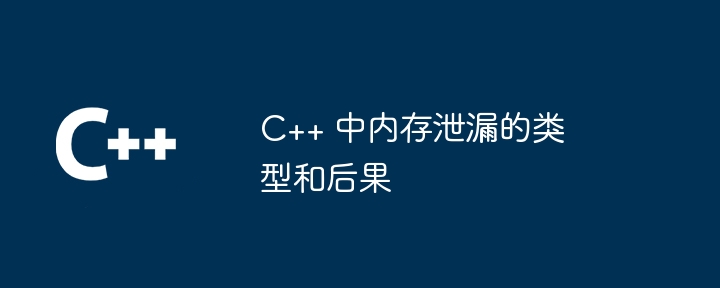Home >Backend Development >C++ >Types and consequences of memory leaks in C++
Types and consequences of memory leaks in C++
- 王林Original
- 2024-05-04 14:54:011186browse
Memory leak type: block memory leak: new allocated memory object leak is not released: the underlying memory is still in use after the object disappears Memory local leak: memory allocated within the function is not released when the function returns Consequences: application out of memory Performance-degrading security vulnerabilities

Types and consequences of memory leaks in C
Introduction
Memory leaks are a common programming problem in C that cause an application to gradually exhaust available memory. It is crucial to understand the types of memory leaks and their consequences in order to write robust and stable code.
Types of memory leaks
There are three main types of memory leaks in C:
-
Blocky memory leaks:Occurs when the memory allocated by
newis not freed bydelete. - Object leak: Occurs when an object disappears from a pointer or reference while the underlying memory is still in use.
- Local memory leak: Occurs when memory allocated inside a function is not released when the function returns.
Consequences
A memory leak can have serious consequences for an application, including:
- Insufficient application memory : All available memory is occupied by leaked memory, causing the program to crash or other unexpected behavior.
- Performance degradation: Memory leaks can reduce the overall performance of a program because the system must constantly allocate and free memory.
- Security: Leaked memory may be exploited by attackers, causing security vulnerabilities.
Practical case
The following code example demonstrates a block memory leak:
int* ptr = new int; // 分配内存 *ptr = 10; // 使用内存 // ... // 忘记释放内存
In this example, the memory pointerptr points to newly allocated memory. However, the program forgets to release the memory by delete ptr when it is no longer needed, causing a memory leak.
Preventing memory leaks
Best practices for preventing memory leaks include:
- Carefully manage memory allocation and deallocation:Use smart pointers or RAII (resource acquisition is initialization) technology.
-
Use diagnostic tools: such as
valgrindor other memory debuggers to detect and isolate memory leaks. - Perform regular maintenance: Regularly check the code for potential memory leaks.
The above is the detailed content of Types and consequences of memory leaks in C++. For more information, please follow other related articles on the PHP Chinese website!

